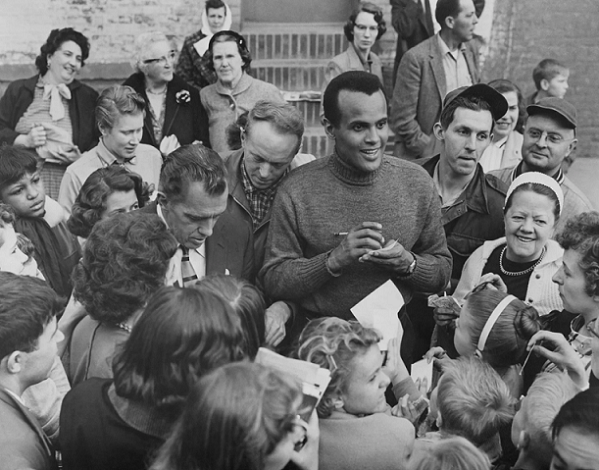
Joshua Jelly-Schapiro, author of the books Island People, Names of New York and a forthcoming book on Harry Belafonte, ponders on how Harry Belafonte’s Caribbean roots helped him change U.S. perspectives as a “mediator of culture and enactor of songs,” bringing “the stories of his people to the world.” Read the full story at NPR. [Many thanks to Peter Jordens for bringing this item to our attention.]
Aboukir, a few hilltops over from Marley’s hometown, isn’t a place that any tourist comes. But the village has its own claim to fame: It’s where a third son of St. Ann’s hills who became a global figure in the 20th century, Harry Belafonte, spent a formative chunk of his boyhood.
Since Belafonte’s death earlier this year at 96, tributes to his monumental life have been dominated by his legacies in the United States. This is the country where he was born and left his deepest marks: by releasing an album of ersatz Caribbean folk tunes, in 1956, that became one of the first LPs by a solo artist to sell a million copies; by being the first Black man to become a sex symbol for mainstream America; by using his resulting royalties and fame to bankroll Martin Luther King’s movement for Civil Rights; by acting as an crucial conduit, as an intimate of Robert Kennedy, between King’s movement and the federal government. And that was just his heyday; his American story also includes chapters, later on, as a pathbreaking guest host of The Tonight Show; as the producer of “We Are the World” and of Beat Street; as an elder radical and moral scold who is also well-recalled, by those of us who grew up in the 1970s and ’80s, as a genial fixture on Sesame Street.
But it’s impossible to understand Belafonte’s larger meaning, as not merely an American figure but a diasporic and global one, without understanding his Caribbean roots. The Jamaican village where he stayed with his grandmother as a boy, amidst St. Ann’s old plantations, was an out-of-the-way corner of a region to whose islands were trafficked the majority of the 10 million enslaved Africans who, between Columbus’s arrival and the 1800s, endured the Middle Passage — but also a place, like communities across this region “where globalization began,” that’s been shaped for centuries by cultural mixing, long-distance trade and the worldly outlook of its people.
Belafonte was born in Manhattan in 1927, to a young Jamaican immigrant who grew wary, as she tried to make rent as a domestic in the Depression, of the trouble her hot-tempered son was finding on New York’s streets. She sent him to her home island for “safekeeping,” as he’d later describe it, on one of the banana boats that the boy’s father, traveling between the West Indies and the States, worked on as a cook. The village where his mum had grown up, and where her own mum still lived, was named by Jamaica’s old British owners for the town in Egypt where Horatio Nelson defeated Napoleon. But its moniker is pronounced “Ah-boo-ka” by locals who are descended from those the British brought to populate this corner of their empire: enslaved Africans, mostly, but also Scottish overseers and laborers like the forebears of Belafonte’s white grandmother.
Some years ago, while on a trip to Jamaica, I tracked down some of Belafonte’s maternal cousins in Aboukir and wrote him a letter about meeting his kin there. He replied warmly and, after arranging to meet for lunch near his home on Manhattan’s Upper West Side, reflected over a plate of clams on how his Caribbean identity had aided his success in Eisenhower’s America. Harry and his best friend Sidney Poitier — Poitier grew up in the Bahamas; the pair met as young stagehands in Harlem — were able to break taboos, in Hollywood and beyond, unthinkable to Black contemporaries who were less foreign-seeming than Poitier or darker-skinned than Belafonte. Harry’s white fans who embraced his sunny songs of the islands, he agreed, were much more able to imagine welcoming into their homes the “Caribbean gentleman” whose image they both cultivated — exotic and charming, proper and safe — than Black American entertainers who, descended from Dixie’s slaves, carried more threatening baggage. Also, there was this: “When me and Sidney were coming up, people took the way we carried ourselves as proud, imperial. But that’s every f***ing Jamaican I know! And a lot of them are a pain in the ass!”
Imperial bearing and all, Belafonte’s brilliance as a performer was as a translator of folk histories, and the lives of working people, into the idiom of pop. In Jamaica, where Marcus Garvey’s devotees included Belafonte’s mother, Garvey had addressed slavery’s legacies by advocating for “Africa for the Africans, at home and abroad.” Bob Marley would confront the same history’s scars, a couple of generations later, by espousing a religion — Rastafari — built from Garvey’s ideas. Belafonte, who came of age at the century’s heady midpoint, collected stories. He didn’t write his own songs; he mediated others’. For this, some purists gave him flack. But it was as a mediator of culture and enactor of songs — carried by his gorgeous voice, lent the glamour of his person — that he brought the stories of his people to the world, and changed it. [. . .]
For original article and https://www.npr.org/2023/12/29/1221394980/harry-belafonte-remembrance-caribbean
[Photo above: Harry Belafonte, alongside Ed Sullivan, signs autographs for fans outside CBS Studio 50 in New York City, circa 1955. Archive Photos/Hulton Archive/Getty Images.]
Joshua Jelly-Schapiro, author of the books Island People, Names of New York and a forthcoming book on Harry Belafonte, ponders on how Harry Belafonte’s Caribbean roots helped him change U.S. perspectives as a “mediator of culture and enactor of songs,” bringing “the stories of his people to the world.” Read the full story at NPR. [Many thanks to







